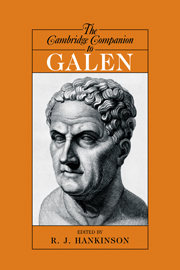Book contents
- Frontmatter
- 1 The man and his work
- 2 Galen and his contemporaries
- 3 Methodology
- 4 Logic
- 5 Language
- 6 Epistemology
- 7 Psychology
- 8 Philosophy of nature
- 9 Anatomy
- 10 Physiology
- 11 Therapeutics
- 12 Drugs and pharmacology
- 13 Commentary
- 14 The fortunes of Galen
- Appendix 1: A guide to the editions and abbreviations of the Galenic corpus
- Appendix 2: English titles and modern translations
- Bibliography
- Index
6 - Epistemology
Published online by Cambridge University Press: 28 September 2008
- Frontmatter
- 1 The man and his work
- 2 Galen and his contemporaries
- 3 Methodology
- 4 Logic
- 5 Language
- 6 Epistemology
- 7 Psychology
- 8 Philosophy of nature
- 9 Anatomy
- 10 Physiology
- 11 Therapeutics
- 12 Drugs and pharmacology
- 13 Commentary
- 14 The fortunes of Galen
- Appendix 1: A guide to the editions and abbreviations of the Galenic corpus
- Appendix 2: English titles and modern translations
- Bibliography
- Index
Summary
If there's one thing that Galen thinks he knows, it is that human beings are capable of knowing things. Indeed, if they are intelligent, industrious and uncorrupted by base physical desires, then they are capable of knowing quite a lot. On the other hand, there are inherent limitations to what human beings can know; and speculative philosophy has tended to over-estimate its ability to discover truth, or even plausibility, in its more abstruse reaches. Galen, then, is no sceptic; indeed, his contempt for scepticism is boundless. But nor is he a hopeless epistemological optimist either. If human knowledge has its scope, it also has its limits. But those limits are broad enough to allow the diligent doctor room to discover, and establish, all that he needs to know.
THE FOUNDATIONS OF KNOWLEDGE
It was not always so, however. Galen benefited from a varied education with a variety of teachers, both philosophical and medical. As a result, he was early introduced to the ubiquity and the virulence of the disputes between both doctors and philosophers, disputes which seemed to hold out no hope of rational, non-partisan resolution.
- Type
- Chapter
- Information
- The Cambridge Companion to Galen , pp. 157 - 183Publisher: Cambridge University PressPrint publication year: 2008
- 27
- Cited by

